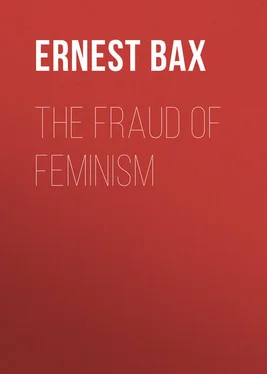Ernest Bax - The Fraud of Feminism
Здесь есть возможность читать онлайн «Ernest Bax - The Fraud of Feminism» — ознакомительный отрывок электронной книги совершенно бесплатно, а после прочтения отрывка купить полную версию. В некоторых случаях можно слушать аудио, скачать через торрент в формате fb2 и присутствует краткое содержание. Жанр: foreign_antique, foreign_prose, на английском языке. Описание произведения, (предисловие) а так же отзывы посетителей доступны на портале библиотеки ЛибКат.
- Название:The Fraud of Feminism
- Автор:
- Жанр:
- Год:неизвестен
- ISBN:нет данных
- Рейтинг книги:3 / 5. Голосов: 1
-
Избранное:Добавить в избранное
- Отзывы:
-
Ваша оценка:
- 60
- 1
- 2
- 3
- 4
- 5
The Fraud of Feminism: краткое содержание, описание и аннотация
Предлагаем к чтению аннотацию, описание, краткое содержание или предисловие (зависит от того, что написал сам автор книги «The Fraud of Feminism»). Если вы не нашли необходимую информацию о книге — напишите в комментариях, мы постараемся отыскать её.
The Fraud of Feminism — читать онлайн ознакомительный отрывок
Ниже представлен текст книги, разбитый по страницам. Система сохранения места последней прочитанной страницы, позволяет с удобством читать онлайн бесплатно книгу «The Fraud of Feminism», без необходимости каждый раз заново искать на чём Вы остановились. Поставьте закладку, и сможете в любой момент перейти на страницу, на которой закончили чтение.
Интервал:
Закладка:
The Original Divorce Law of 1857 in its provisions respecting costs and alimony, constitutes another landmark in the matter of female privilege before the law. Other measures of unilateral sex legislation followed in the years ensuing until the present state of things, by which the whole power of the State is practically at the disposal of woman to coerce and oppress men. But this side of the question we propose to deal with later on.
The present actual movement of Feminism in political and social life may be deemed to have begun in the early sixties, in the agitation which preceded the motion of John Stuart Mill in 1867, on the question of conferring the parliamentary franchise upon women. This was coincident with an agitation for the opening of various careers to women, notably the medical faculty. We are speaking, of course, here of Great Britain, which was first in the field in Europe, alike in the theory and practice of Modern Feminism. But the publication by the great protagonist of the movement, John Stuart Mill, of his book, “The Subjection of Women,” in 1868, endowed the cause with a literary gospel which was soon translated into the chief languages of the Continent, and corresponding movements started in other countries. Strangely enough, it made considerable headway in Russia, the awakening of Russia to Western ideas having recently begun to make itself felt at the time of which we are speaking. The movement henceforth took its place as a permanent factor in the political and social life of this and other countries. Bills for female suffrage were introduced every year into the British House of Commons with, on the whole, yearly diminishing majorities against these measures, till a few years back the scale turned on the other side, and the Women’s Enfranchisement Bill passed every year its second reading until 1912, when for the first time for many years it was rejected by a small majority. Meanwhile both sides of the Feminist movement, apart from the question of the franchise, had been gaining in influence. Municipal franchise “on the same terms as for men” had been conceded. Women have voted for and sat on School Boards, Boards of Guardians, and other public bodies. Their claim to exercise the medical profession has been not merely admitted in law but recognised in public opinion for long past. All the advantages of an academic career have been opened to them, with the solitary exception of the actual conferment of degrees at Oxford and Cambridge. Such has been the growth of the articulate and political side of the theory of Modern Feminism.
The sentimental side of Feminism, with its practical result of the overweighting of justice in the interests of women in the courts, civil as well as criminal, and their practical immunity from the operation of the criminal law when in the dock, has advanced correspondingly; while at the same time the sword of that same criminal law is sharpened to a razor edge against the man even accused, let alone convicted, of any offence against the sacrosanct majesty of “Womanhood.” Such is the present position of the Woman question in this country, which we take as typical, in the sense that in Great Britain, to which we may also add the United States of America and the British Colonies, where – if possible, the movement is stronger than in the mother country itself – we see the logical outcome of Feminist theory and sentiment. It remains to consider the existing facts more in detail, and the psychological bearings of that large number of persons who have been in the recent past, and are being at the present time, influenced to accept the dogmas of Modern Feminism and the statements of alleged facts made by its votaries. Before doing so it behoves us to examine the credibility of the dogmas themselves, and the nature of the arguments used to support them and also the accuracy of the alleged facts employed by the Feminists to stimulate the indignation of the popular mind against the pretended wrongs of women.
CHAPTER II
THE MAIN DOGMA OF MODERN FEMINISM
We have pointed out in the last chapter that Modern Feminism has two sides, the positive, definite, and articulate side, which ostensibly claims equality between the sexes, the chief concern of which is the conferring of all the rights and duties of men upon women, and the opening up of all careers to them. The justification of these demands is based upon the dogma, that, notwithstanding appearances to the contrary, women are endowed by nature with the same capacity intellectually and morally as men. We have further pointed out that there is another side in Modern Feminism which in a vague way claims for women immunity from criminal law and special privileges on the ground of sex in civil law. The basis of this side of Feminism is a sentimentalism — i. e. an unequally distributed sentiment in favour of women, traditional and acquired. It is seldom even attempted to base this sentimental claim for women on argument at all. The utmost attempts in this direction amount to vague references to physical weakness, and to the claim for special consideration deriving from the old theory of the mental and moral weakness of the female sex, so strenuously combated as out of date, when the first side of Modern Feminism is being contended for. The more or less inchoate assumptions of the second or sentimental side of the modern “Woman’s Movement” amounts practically, as already stated, to a claim for women to be allowed to commit crimes without incurring the penalties imposed by the law for similar crimes when committed by men. It should be noted that in practice the most strenuous advocates of the positive and articulate side of Feminism are also the sincerest upholders of the unsubstantial and inarticulate assumptions of the sentimental side of the same creed. This is noticeable whenever a woman is found guilty of a particularly atrocious crime. It is somewhat rare for women to be convicted of such crimes at all, since the influence of sentimental Feminism with judges and juries is sufficient to procure an acquittal, no matter how conclusive the evidence to the contrary. Even if women are found guilty it is usual for a virtually nominal sentence to be passed. Should, however, a woman by any chance be convicted of a heinous crime, such as murder or maiming, under specially aggravated circumstances, and a sentence be passed such as would be unanimously sanctioned by public opinion in the case of a man, then we find the whole Feminist world up in arms. The outcry is led by self-styled upholders of equality between the sexes, the apostles of the positive side of Feminism, who bien entendu claim the eradication of sex boundaries in political and social life on the ground of women being of equal capacity with men, but who, when moral responsibility is in question, conveniently fall back on a sentiment, the only conceivable ground for which is to be found in the time-honoured theory of the mental and moral weakness of the female sex. As illustrations of the truth of the foregoing, the reader may be referred to the cases of Florence Doughty in 1906, who shot at and wounded a solicitor with whom she had relations, together with his son; to Daisy Lord in 1908, for the murder of her new-born child; to the case of the Italian murderess, Napolitano in Canada, convicted of the cold-blooded butchery of her husband in his sleep in 1911, for whose reprieve a successful agitation was got up by the suffrage societies!
Let us first of all consider the dogma at the basis of the positive side of Modern Feminism, which claims rational grounds of fact and reason for itself, and professes to be able to make good its case by virtue of such grounds. This dogma consists in the assertion of equality in intellectual capacity, in spite of appearances to the contrary, of women with men. I think it will be admitted that the articulate objects of Modern Feminism, taking them one with another, rest on this dogma, and on this dogma alone. I know it has been argued as regards the question of suffrage, that the demand does not rest solely upon the admission of equality of capacity, since men of a notoriously inferior mental order are not excluded from voting upon that ground, but the fallacy of this last argument is obvious. In all these matters we have to deal with averages. Public opinion has hitherto recognised the average of women as being intellectually below the voting standard, and the average man as not. This, if admitted, is enough to establish the anti-suffrage thesis. The latter is not affected by the fact that it is possible to find certain individual men of inferior intelligence and therefore less intrinsically qualified to form a political judgment than certain specially gifted women. The pretended absurdity of “George Eliot having no vote, and of her gardener having one” is really no absurdity at all. In the first place, given the economic advantages which conferred education upon the novelist, and not upon the gardener, there is not sufficient evidence available that his judgment in public affairs might not have been even superior to that of George Eliot herself. Moreover, the possession of exceptionally strong imaginative faculty, expressing itself as literary genius or talent in works of fiction, does not necessarily imply exceptional power of political judgment. But, be this as it may, where averages are in question, exceptions obviously do not count.
Читать дальшеИнтервал:
Закладка:
Похожие книги на «The Fraud of Feminism»
Представляем Вашему вниманию похожие книги на «The Fraud of Feminism» списком для выбора. Мы отобрали схожую по названию и смыслу литературу в надежде предоставить читателям больше вариантов отыскать новые, интересные, ещё непрочитанные произведения.
Обсуждение, отзывы о книге «The Fraud of Feminism» и просто собственные мнения читателей. Оставьте ваши комментарии, напишите, что Вы думаете о произведении, его смысле или главных героях. Укажите что конкретно понравилось, а что нет, и почему Вы так считаете.












